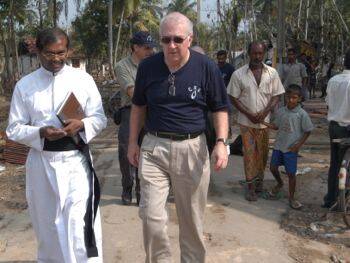When Ken Hackett graduated from Boston College with a business degree in 1968, he expected to work in the corporate world, handling big money accounts, maybe at the phone company that employed his dad. But a spontaneous decision to instead join the Peace Corps led Hackett to the career from which he's retiring in January, running Catholic Relief Services, an institution with a nearly billion-dollar-a-year budget and 5,000 employees worldwide. On paper that might look like he wound up where his education pointed him, but the reality is far more interesting. "This is much more complicated" than working in a U.S.-based business would have been, Hackett told Catholic News Service during an early December interview in his Baltimore office. "There are many more stakeholders, the stakes are much higher. And getting it right -- doing it right -- is much more important." Hackett will overlap a short time with his successor, Carolyn Woo, 57, dean of the Mendoza College of Business at the University of Notre Dame and a CRS board member. Hackett, who will turn 65 Jan. 12, got to the top of CRS in 1993 by a route that started with trying to grow new strains of cocoa and corn in rural Ghana with the Peace Corps and brought him to CRS four years later. His first years with CRS involved helping run a program to promote breast-feeding and some nutrition and agriculture projects in Sierra Leone. His career track took him throughout Africa for the better part of two decades and to the Philippines in the late 1980s. His assignments included running CRS's relief program during Ethiopia's devastating famine of 1984-85 and heading CRS operations in East Africa during Somalia's civil war in the early 1990s before he moved back to CRS headquarters in the U.S. As he prepared to retire, Hackett looked back at an adrenaline-filled career of trying to help the victims of catastrophic events: hurricanes, tsunamis, volcanic eruptions, earthquakes, famine, floods, war and genocide. Despite the enormity of those relief efforts, what Hackett singles out as probably the most significant accomplishment of his tenure has been the change he made to more intentionally base everything CRS does in the principles of Catholic social teaching. The ah-ha moment that led to the shift was the Rwandan civil war of 1994 and the genocide that left an estimated 800,000 people dead in 10 days of tribal-based violence. "We'd been working there for years," Hackett said. "We knew about the tensions between the Hutus and the Tutsis, but we weren't doing anything about it. We were building schools and doing micro-development loans," without paying attention to the simmering race-based hatred around them.
Hackett Looks Back on 'Adrenaline-Filled' Career
Show Comments (
)
Comments are automatically closed two weeks after an article's initial publication. See our comments policy for more.
The latest from america
Frank Turnbull, S.J., a longtime editor at 'America' who died earlier this week, is remembered as a humble, quiet and yet forceful presence to those who knew him during his 85 years of life.
A Reflection for Saturday of the Fifteenth Week in Ordinary Time, by Zac Davis
Trauma-informed spirituality knows better than to promise that prayer will take away all the pain. But it can offer the hope that, even in the midst of pain, there can be moments of feeling whole.
Israeli Prime Minister Benjamin Netanyahu telephoned Pope Leo XIV, who urged Israel’s leader to revive negotiations and enact a ceasefire.








